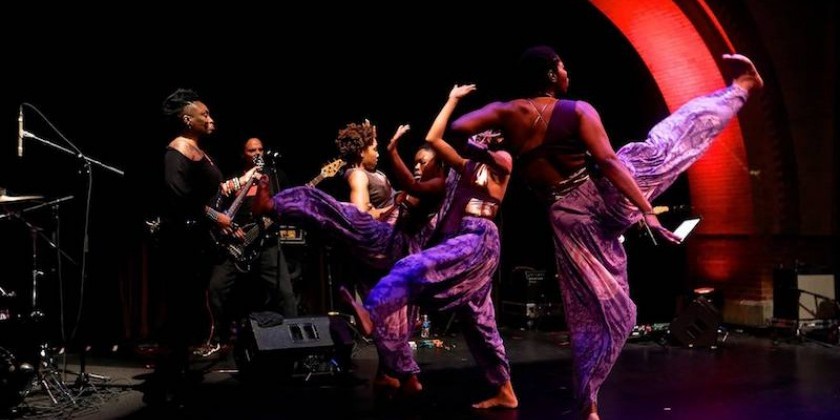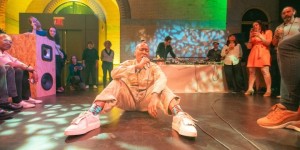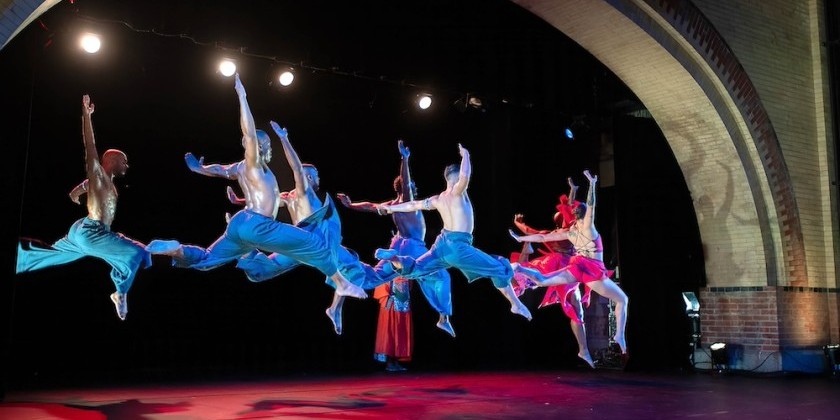Impressions of: Tamar-kali’s "Demon Fruit Blues" — A Work-in-Progress Showing at Harlem Stage

Presented by Harlem Stage and AFROPUNK, New York, NY
February 22, 2017; 7:30PM
Composer: Tamar-kali
Choreographer: Adia Whitaker
Director: Ashley Brockington
Musicians: Tamar-kali, Ann Klein, Jerome Jordan, Jeremiah Hosea, Mark Robohm, Lisette Santiago
Ase Dance Theatre Collective: Adia Whitaker, Efeya Sampson, Kendra Ross, Erin Holmes
Pictured about: Tamar-kali and Ase Dance Theatre Collective
The work-in-progress showing of Demon Fruit Blues, bookended by a film screening and panel discussion, beautifully shatters the fourth wall from the get-go. It extends each of us in Harlem Stage's sold-out house a true glimpse into the progress at hand, and — better yet — the conversation.
And it’s no small conversation. In a sentence, Demon Fruit Blues is described as “a multidisciplinary work that explores and interrogates gender binaries, patriarchy, and womanhood by examining the origins of misogyny.” Deconstructed further, it ultimately aims to question the ‘curse of womanhood’ found in Judeo-Christian ideology,” consider the modern/western perception of the female body, and “heal a culture of ‘unspoken’ influences,” including issues surrounding race.
The journey to bring these comprehensive themes to the stage began last summer, with initial showings at Central Park SummerStage. Now, presented as part of the AFROPUNK: The Takeover—Harlem festival in commemoration of Black History Month, we delve deeper. By the evening’s end we not only have a taste of the piece itself, but also the motivation and dialogue that will continue to drive the work’s development over the next two years.

The screening of Ralston Smith’s behind-the-scenes video is our first encounter with song-writer, musician, and vocalist Tamar-kali — leading the charge for this work — and collaborator Adia Whitaker, Artistic Director of Ase Dance Theatre Collective (ADTC). A rare treat, we witness snippets of band and dance rehearsals, and a moment of dissenting opinions among the artists; later, seeing firsthand where they landed.
The showing itself marries the music and movement crafted to date, taking form in seven vignettes. Musically, Tamar-kali and her five-piece band blend modern day rock, gospel, the blues, and original African rhythms. Whitaker dances alongside ADTC members, all of whom specialize in African Diaspora-driven dance theater. Together, they explore themes of motherhood, sexuality, spirituality, unity, and the enduring trauma brought by 246 years of black enslavement in America.
A thought-provoking and lively panel discussion follows, featuring the full artistic team, including Director Ashley Brockington, and guest panelist Feminista Jones. Almost immediately, moderator Shani Jamila calls out these lyrics from Tamar-kali’s music (which I too wrote down, in all caps): “tsunami of resistance.” Those words emerge a fitting takeaway.
Through the frank discussion, we hear the personal thoughts and experiences of each panelist as women, and as black women, today. At one point, Tamar-kali states, “I’m super committed to being unapologetically human. Yes, when I wake up in the morning and take a breath, I do it as a black woman.” She goes on to speak to a holistic view of the undeniable racial divide embedded in our history and present, calling on all of us to acknowledge our relationship with it — affected and infected alike.

Jones commends the performance developed thus far, saying, “I have this idea that the safest space for our voice as black women is in music. I saw that here. I saw the declaration of freedom, the creation of space to just be who we are.” Whitaker speaks passionately about her choreography and the spiritual act of performance. “The things that I make are prayers,” she notes, “and prayers are for healing.”
This is just the beginning of Demon Fruit Blues, which will evolve into a full-evening suite and, unquestionably, a continued conversation. I’ll leave you with this, from Tamar-kali: “As of late, I’m very much in tune with the idea that [my work] is an offering. I know I created it, but it doesn’t feel like mine anymore.”
To join the journey of Demon Fruit Blues as it approaches its world premiere in the spring of 2019, follow Harlem Stage, Tamar-kali, and Ase Dance Theatre Collective.
The Dance Enthusiast Shares Impressions and Creates Conversations
For more Impressions, click here.
Share your #AudienceReview of this show or others for a chance to win a $75 giftcard to Trader Joe's.













